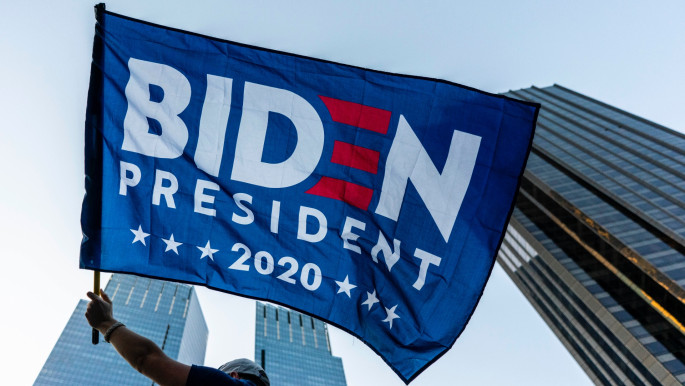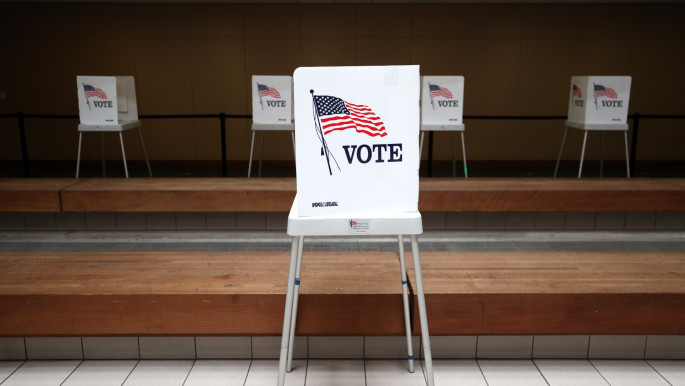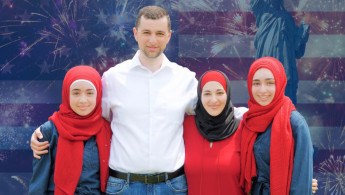Meet Fady Qaddoura, Indiana's first Muslim state senator
In 2005, Fady Qaddoura was in the midst of doing his master's degree in computer science at the University of New Orleans in Louisiana when Hurricane Katrina struck, destroying his home and leaving him and his family homeless with a three-week-old daughter.
It was at that moment, having received help from volunteers, NGOs and government agencies, that he decided to go into public service.
"I was fascinated by the idea of reciprocating kindness and helping humanity. In 2005, I walked away from my master's and decided to dedicate my life to public service," he recalls, speaking from Indianapolis a week after his win in the Indiana State Senate race, in which he ousted incumbent John Ruckelshaus.
He is now the first Arab Muslim lawmaker in Indiana's history, and he is currently only one out of 11 Democratic senators out of 50.
This was a major shift from the life path he had previously set out on, which was to finish his degree so that he could take care of his family. He now has two master's degrees and a PhD in public policy.
In the long run, this was perhaps not so much a shift, but rather a larger plan to impact more people.
 |
Fady Qaddoura is the first Arab Muslim lawmaker in Indiana's history |  |
Making an impact through local politics
The three main issues that he's focused on as state senator are educational equity, healthcare expansion and helping small businesses recover from their losses during the pandemic, issues he's already tackled through his work in NGOs and as comptroller in the state government.
He worked with the agency responsible for Medicaid, and he also he helped with Indiana's expansion of the Affordable Care Act, the government healthcare program initiated by former President Barack Obama.
 |
|
| Read more: How Arabs and Muslims helped flip Michigan blue for Biden |
"These experiences at the state and city levels made me realise the impact of laws on everyday people," he told The New Arab.
He points to current Vice President Mike Pence's spell as the state's governor, during which time the state government passed discriminatory laws against immigrants, which affected Syrian refugees who had tried to settle in Indiana.
Although a federal court ultimately blocked the state's attempt at a refugee ban, the proposal nonetheless signalled that the state was not a welcoming place for certain people.
"He wanted to ban them from entering Indiana. He was sending a message saying: we don't welcome everyone in the state. Seeing the government promoting a law discriminating against people, I wanted to be sure that every vote I cast would help people's lives," says Qaddoura, whose own experience with adversity has helped him understand the needs of his constituents.
"I've talked to people of different backgrounds, and my story resonated with them. I know what it's like to live without a paycheck or health insurance. When you talk to people about their dreams, they will listen," he says.
 |
In the Middle East, people take care of one another, even with limited resources, with love and compassion for their neighbour. It makes me want to bring that to my community here |  |
At the same time, his high level of education puts him in a unique position of understanding data, policy and government workings that few politicians have when they assume office.
"To me, that was intentional by design. When I decided to be a public servant, I meant it," he said, referring to his decision to pursue a PhD in public policy at Indiana University - Purdue University Indianapolis.
"I wanted to attain the highest level of knowledge to solve world problems, such as poverty and healthcare. I wanted to learn at the highest level about these problems." To him, education is key to moving his plans forward.
 |
|
| Read more: The Arab and Muslim candidates fighting to transform American politics |
"You can be a public servant, but if you're equipped with education, you can be more influential. You're empowered by knowledge, data and facts. You don't want to repeat failures of the past," he says. "Fortunately, in Indiana, they were happy and amazed and impressed to see an educated person running for public office. You're equipped to solve problems. It's an added incentive."
Reconciling identities
Though his choice of public service in Indiana might seem a world away from his first home city of Ramallah, some of his earliest influences came from his upbringing in the West Bank.
He was 13 years old when the Oslo Accords were signed, a time he remembers as hopeful, when people thought about building their society and reaching their potential. Even as a teenager, he recalls thinking about "building a society with love and respect."
 |
At the end of the day, it doesn't matter if you're a Republican or a Democrat, you are elected not to serve a political party, but to serve the people in your community |  |
"In the Middle East, people take care of one another, even with limited resources, with love and compassion for their neighbour. It makes me want to bring that to my community here."
But first, he says, he would have to reconcile his two identities – being both Muslim and American.
 |
|
| Read more: Navigating Arab identity in America's racial landscape |
"There were still cultural differences – daily activities, how people interact, the language difference. It was a major adjustment to reconcile my identity as a Muslim and as an American," he says. "That's a process immigrants go through – reconciling their identity with a new place." In the end, he says, he found "no contradiction, and actually there was an alignment with my faith."
As he gets ready to assume his position as state senator, where he will be serving in the minority, he carries with him the idea of reconciliation – this time between political parties.
"At the end of the day, it doesn't matter if you're a Republican or a Democrat, you are elected not to serve a political party, but to serve the people in your community. The number one priority should never be political affiliation. It's about the people you serve and how you serve them, and that's what I intend to do," Qaddoura says.
"The country is divided. We need to reconcile and bring people together. I will work on uniting people."
Brooke Anderson is a freelance journalist covering international politics, business and culture
Follow her on Twitter: @Brookethenews



![sudan women [getty] sudan women [getty]](/sites/default/files/styles/image_330x185/public/media/images/5019D7F4-52AF-4377-8A05-885D27476479.jpg?h=d1cb525d&itok=tKXV7r-W)